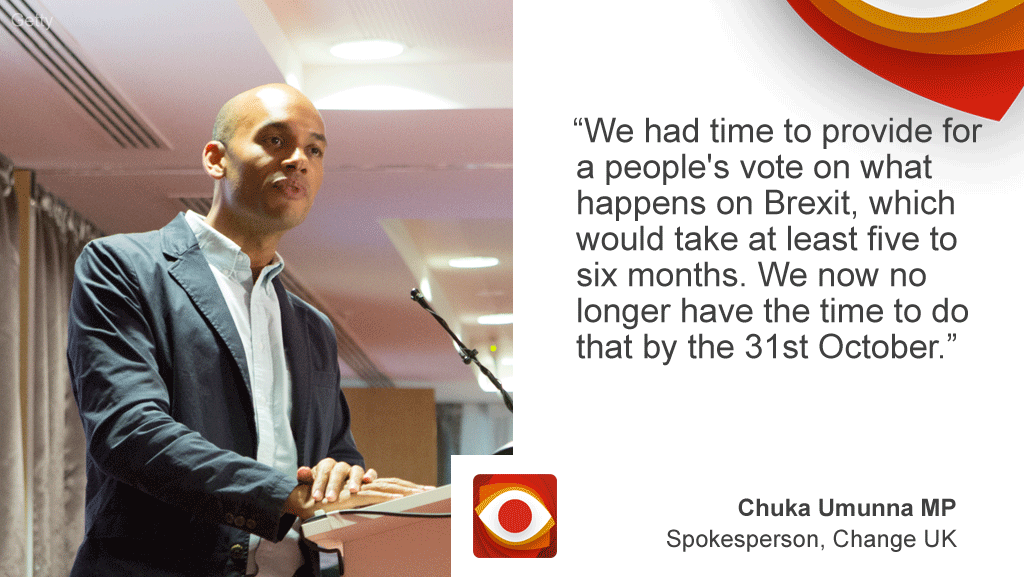Brexit: Has time run out for another referendum?
- Published

Claim: There is not enough time to organise and hold another referendum before the UK is is due to leave the EU, on 31 October.
Reality Check verdict: Constitutional experts say it takes a minimum of 22 weeks to organise a referendum. There are just over 23 weeks until 31 October, so time has almost run out.

Change UK, the new political party created by 11 former Conservative and Labour MPs, says it supports the idea of another public vote on Brexit and that it would campaign to remain in the European Union (EU) if one was held.
However, Chuka Umunna, its spokesman, told BBC News there was no longer enough time to organise another referendum before the UK was due to leave the European Union (EU), on 31 October.
Mr Umunna added: "We are now at the point where we are going to have to revoke Article 50," which would mean stopping the entire Brexit process.
Change UK says such a move would be necessary to prevent a no-deal Brexit, which it describes as a "national emergency".
But has time really run out?
Reality Check has previously looked at the question of how long it would take to organise a new public vote.
We spoke to experts at the Constitution Unit at University College London (UCL). They told us the process would take a minimum of 22 weeks.
This would consist of at least 12 weeks to pass the legislation required to hold a referendum, plus a further 10 weeks to organise the campaign and hold the vote itself.
A government cannot just decide to hold a referendum - it requires a majority of MPs and peers to support one through a vote.
But even if a majority of MPs favoured the idea of a new referendum in principle, there's no guarantee that the legislation would be passed in 12 weeks - especially if there's a lot of disagreement in Parliament.
Potential flashpoints could be over the wording of the referendum question, the number of options on the ballot paper and the voting system.
Such arguments could add further delay in passing the legislation.
As for the 10-week campaign period, the Electoral Commission says existing law stipulates this is a rigid period that cannot be shortened. This is to allow enough time for official campaigns to be selected, information to be sent to voters and for returning officers to be organised
So, a 22-week period (allowing for legislation and a campaign) would leave time incredibly tight - in fact, even if the process was started now, it would take us into the second half of October, less than ten days before the date of the extended Article 50 deadline, when Brexit is due to happen.
But the EU might be willing to grant a further extension to Article 50 to allow a referendum to take place (say for a few more weeks).
The 10-day referendum
Surely though, if time really is of the essence, a referendum could be organised more quickly?
Three years ago, Greece organised a referendum in just over a week, in which voters rejected the terms of an international bailout following the country's debt crisis.
But holding votes this quickly can cause governments to "run into a legitimacy problem", says Meg Russell, director of the Constitution Unit.
For example, a referendum organised too hastily in the UK might not allow enough time to organise postal votes or for the Electoral Commission to assess the question on the ballot paper.
"There's a reason for not cutting corners, it's so people don't come back and say they've been cheated," adds Prof Russell.
So while at the time of writing it's not impossible to organise a new Brexit referendum in time, MPs would need to introduce and pass the necessary legislation very soon in order to guarantee a new vote by 31 October without cutting corners.


- Published9 July 2019
